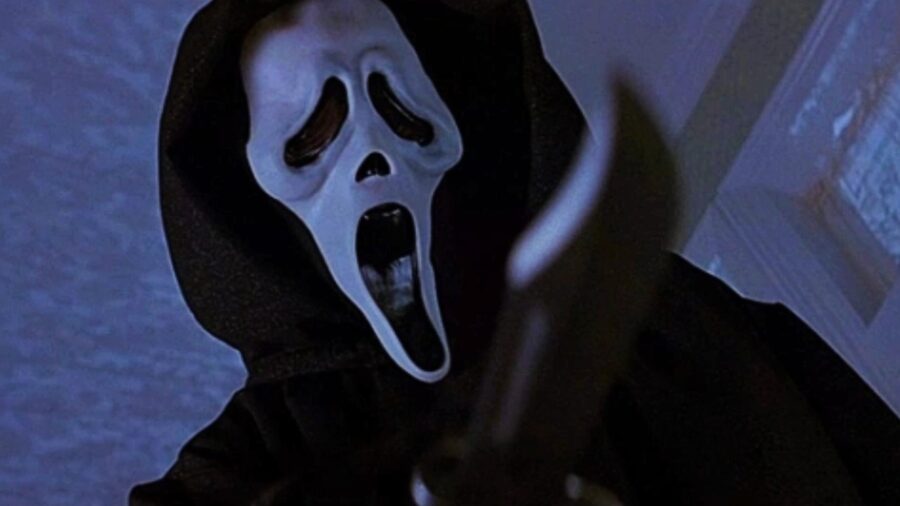Did Scream Ruin Horror Movies Forever?
Scream made self-aware horror cool and ensured a hundred terrible imitations.
This article is more than 2 years old
Scream is one of the great success stories of 1990s horror and, arguably, the genre as a whole. By the time the first Wes Craven-Kevin Williamson movie was released in 1996, the genre had increasingly been relegated to increasingly dismal franchise sequels (1990 alone had Child’s Play 2, The Exorcist III, Leatherface: The Texas Chainsaw Massacre III, Psycho IV: The Beginning, and Silent Night, Deadly Night 4: Initiation), but Scream kicked off a whole new kind of meta-oriented horror that has not slowed down since. In fact, it can be argued that while Scream may have revitalized horror in the short term, it has hurt the genre more than it has helped.
To be fair to Scream and knock it off its pedestal a little, it is not like screenwriter Kevin Williamson was the first to come up with the idea of a self-aware horror movie. Friday the 13th Part VI: Jason Lives had dabbled in breaking the fourth wall and some self-referential jokes to decent enough success for a fifth sequel and Wes Craven’s New Nightmare had Freddy Krueger as a fictional character stalking with the real-life Nightmare on Elm Street actors like Heather Langenkamp. But nothing had hit with as great success as Scream’s combination of teenagers with an encyclopedic knowledge of horror tropes and why it was important to not get laid.
Horror might be the most imitative film genre out there, with every Halloween followed by a dozen generic slashers. As one might expect, Scream immediately kicked off a legion of self-aware horror films, many of them written by Kevin Williamson himself, like I Know What You Did Last Summer and The Faculty. But unlike other genres of film particularly susceptible to trends (like the dozen or so Star Wars knock-offs released in the early 1980s), horror hangs on to an idea pretty much forever.

That’s why we are getting a Saw 10 soon, and why Hellraiser just released its eleventh (and pretty decent) movie on Hulu. As denatured and watered down as a horror movie’s hook gets, it always sticks around in the genre, long after science fiction fans have tried to come up with a new spin on space wizards and evil empires. But once Scream made self-awareness a commercial prospect, it pretty much ensured every subsequent horror film would do the same.
There’s a problem with that: being meta is not inherently scary or even clever. The lasting appeal of Scream is not that its protagonists understand how horror movies work and comment on them, but that they desperately try to use that knowledge to survive (and often fail). Conversely, the villains know that they know and everyone is trying to outwit and outlast while the phones ring, the popcorn pops, and the Drew Barrymores get disemboweled.
Too many of Scream’s imitators felt that simply making self-referential was enough of a hook, but worse, far too many saw it as an opportunity to get goofy. The Scary Movie franchise (which, amusingly enough, was the original working title of Scream) turned Ghostface into a figure of fun almost immediately, and to its credit, was so good at it that it essentially disarmed the character. More and more films of this type have leaned on the comedy aspect of “comedy horror” to the point that they needn’t have bothered with the second part.
And it is fine that there is comedy horror out there. The original 1996 Scream is a very funny movie in its own way, and movies like Tucker & Dale Vs. Evil and Cabin in the Woods understand that horror and comedy are two sides of one coin. The elements of suspense, build-up, and cathartic release are fundamental to both, just one ends with laughter and the other ends up with a bunch of bloody bodies.
But the massive commercial success of Scream is also responsible for far too many broad jokes, mugging reaction shots, and monologues about how you know that the killer knows and that they know and so forth. The latest Scream film (which seems ready to carry the franchise into a new cast of characters) is perhaps the most reliant on the idea that every single character in it is not just aware of how horror movies work, but how the earlier experiences of every single character line up to horror tropes and how the things they are doing reflect on those actions and ad infinitum.
Frankly, it’s exhausting. Sometimes, horror might just need to let things die.












